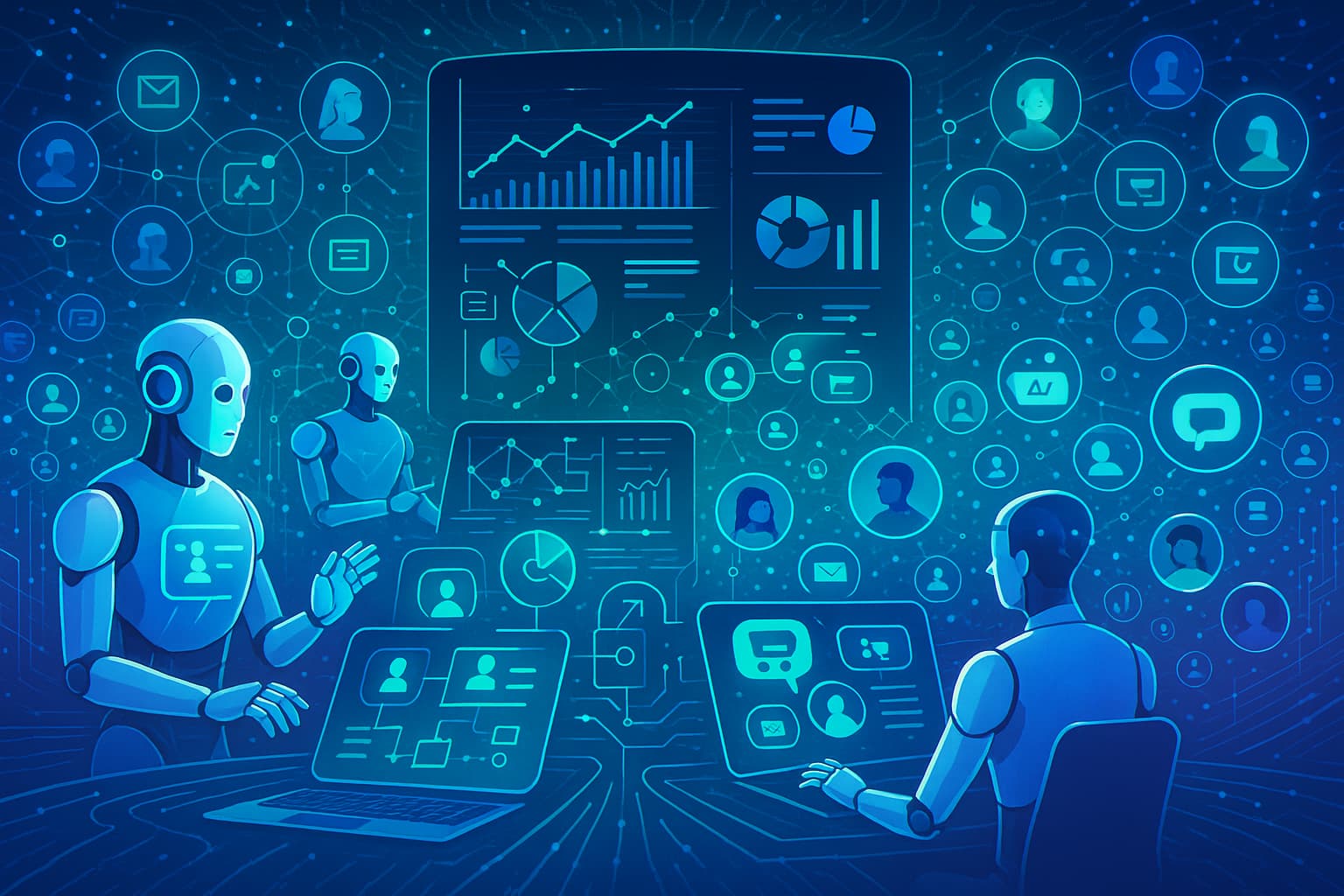Agentic Marketing



Agentic Marketing: How AI Agents Automate and Personalize Campaigns
The marketing landscape has evolved beyond traditional automation into an era where intelligent AI agents independently execute complex strategies and deliver hyper-personalized experiences.
These autonomous systems don't just follow pre-programmed rules—they analyze, adapt, and optimize marketing efforts in real-time, enabling marketers to scale personalization while maintaining strategic control over brand messaging and customer engagement.
What is Agentic Marketing?
Agentic marketing represents a paradigm shift from rule-based marketing automation to intelligent, goal-oriented AI systems that can independently plan, execute, and optimize marketing strategies.
Unlike traditional automation that follows predetermined workflows, agentic systems possess decision-making capabilities, learning from data patterns to adjust tactics dynamically.
These AI agents operate with defined objectives—such as improving conversion rates or reducing customer acquisition costs—and autonomously determine the best methods to achieve those goals.
The "agentic" aspect refers to the system's ability to act independently within established parameters, making strategic decisions without constant human intervention while continuously refining approaches based on performance data.
Key Elements of Agentic Marketing Strategies
Autonomous AI Agents
Self-operating AI systems that handle complex marketing tasks without human intervention, from campaign optimization to content personalization.
These agents continuously monitor performance metrics, adjust bidding strategies, and refine targeting parameters based on real-time data analysis.
Their autonomous nature allows marketing teams to focus on strategic planning while ensuring tactical execution remains responsive to market conditions.
Predictive Analytics Integration
Advanced machine learning models that forecast customer behavior, market trends, and campaign performance to inform strategic decisions.
These systems analyze historical data patterns alongside real-time signals to predict optimal timing, messaging, and channel selection for maximum impact.
Predictive capabilities enable proactive strategy adjustments rather than reactive optimization.
Multi-Channel Orchestration
Coordinated AI-driven management across all marketing touchpoints, ensuring consistent messaging and optimal resource allocation.
Agents synchronize campaigns across email, social media, paid advertising, and content platforms while maintaining brand coherence.
This orchestration eliminates channel silos and creates unified customer experiences.
Dynamic Content Generation
Real-time creation and optimization of marketing materials tailored to individual customer profiles and contextual factors.
AI agents generate personalized subject lines, ad copy, product recommendations, and landing page variations at scale.
Content adapts based on user behavior, demographic data, and engagement history.
Behavioral Trigger Systems
Intelligent automation that responds to customer actions with precisely timed, personalized interventions.
These systems identify intent signals and engagement patterns to deliver contextually relevant messages at optimal moments.
Behavioral triggers operate across the entire customer lifecycle, from awareness through retention.
Optimize Marketing Workflows with AI Agents
AI agents transform marketing operations by creating seamless integrations between disparate tools and platforms, eliminating manual data transfers and reducing operational friction.
These intelligent systems connect CRM platforms, marketing automation tools, ad networks, and analytics dashboards to create unified data flows that enable real-time decision-making.
For instance, an AI agent can automatically sync lead scoring data from your CRM with ad platform audiences, adjusting campaign targeting as prospects move through the sales funnel.
The integration extends to performance optimization workflows, where agents continuously monitor campaign metrics across channels and automatically implement adjustments based on predetermined performance thresholds.
When a social media campaign underperforms, the agent can reallocate budget to higher-performing channels, adjust audience targeting parameters, or modify creative elements without human intervention.
This level of workflow automation ensures marketing operations remain optimized 24/7, responding to market conditions faster than traditional manual processes allow.
Advanced workflow optimization includes predictive maintenance of marketing systems, where AI agents identify potential performance issues before they impact campaign results.
They monitor data quality, flag anomalies in tracking systems, and ensure proper attribution across touchpoints, maintaining the integrity of marketing measurement and optimization cycles.
Making Smarter Marketing Decisions with Real-Time Data
Real-time data processing capabilities enable AI agents to make strategic marketing decisions with unprecedented speed and accuracy, transforming reactive marketing approaches into proactive, data-driven strategies.
These systems continuously ingest data from multiple sources—website analytics, customer interactions, market conditions, and competitive intelligence—to identify emerging opportunities and threats as they develop.
Decision-making algorithms analyze complex data relationships that human marketers might miss, such as correlations between weather patterns and product demand, or subtle shifts in customer sentiment that precede purchasing decisions.
AI agents can detect when market conditions favor aggressive expansion strategies or when defensive positioning becomes necessary, automatically adjusting campaign parameters to capitalize on these insights.
The sophistication of real-time decision-making extends to micro-level optimizations that occur thousands of times per day.
Agents continuously test variables like ad placement timing, email send frequencies, and content personalization parameters, learning from each interaction to refine future decisions.
This creates a feedback loop where marketing effectiveness compounds over time, as agents accumulate strategic intelligence that informs increasingly sophisticated decision-making processes.
Personalized Customer Journeys at Scale
Agentic marketing systems excel at creating individualized customer experiences across thousands or millions of unique customer paths simultaneously.
Unlike traditional segmentation approaches that group customers into broad categories, AI agents analyze individual behavioral patterns, preferences, and contextual factors to craft personalized journeys for each prospect and customer.
These personalized journeys adapt dynamically as customers interact with your brand, with AI agents recognizing intent signals and adjusting subsequent touchpoints accordingly.
A customer who engages deeply with technical content receives more detailed product information, while someone focused on pricing sees competitive comparisons and value propositions.
The system learns from each interaction, refining its understanding of individual preferences to improve future personalization efforts.
Scale achievement occurs through intelligent template systems that combine modular content elements based on customer profiles and journey stage.
AI agents select appropriate messaging frameworks, adjust content depth and complexity, and determine optimal communication frequencies for each individual.
This approach maintains the intimacy of one-to-one marketing while operating efficiently across large customer bases.
Leveraging AI Agents in Social Media Marketing
Social media marketing benefits significantly from agentic AI systems that monitor conversations, engage with audiences, and optimize content performance across multiple platforms simultaneously.
These agents analyze social listening data to identify trending topics, sentiment shifts, and engagement opportunities, automatically adjusting content calendars and messaging strategies to align with current social dynamics.
Content optimization occurs through continuous testing of post timing, hashtag combinations, visual elements, and engagement tactics.
AI agents identify which content formats resonate with specific audience segments, optimizing posting schedules based on when different customer groups are most active and responsive.
They also monitor competitor activities and industry conversations to identify content gaps and competitive positioning opportunities.
Community management capabilities enable AI agents to handle routine customer service inquiries, engage with user-generated content, and escalate complex issues to human team members.
These systems maintain brand voice consistency while providing immediate responses to customer questions, improving engagement rates and customer satisfaction metrics.
Generative AI's Role in Agentic Marketing
Generative AI serves as the creative engine within agentic marketing systems, producing vast quantities of personalized content, copy variations, and creative assets that fuel individualized customer experiences.
These systems generate everything from email subject lines and ad copy to blog post outlines and social media captions, maintaining brand voice consistency while adapting tone and messaging for specific audience segments.
The integration of generative AI with agentic systems creates dynamic content ecosystems where marketing materials evolve continuously based on performance data and customer feedback.
AI agents analyze which generated content performs best for different customer segments, refining prompts and parameters to improve future content quality and relevance.
Advanced applications include dynamic landing page generation, where AI agents create personalized page layouts, headlines, and calls-to-action based on traffic source, customer profile, and behavioral data.
This level of content personalization extends to video and audio content, where generative AI creates variations in messaging, music, and visual elements to optimize engagement across diverse audience preferences.
Common Pitfalls to Avoid in Agentic Marketing
Over-Relying on Automation Without Human Oversight
Many organizations implement agentic systems without establishing proper governance frameworks, leading to AI agents making decisions that conflict with brand values or market positioning.
Without human oversight, agents may optimize for short-term metrics while damaging long-term brand equity or customer relationships.
Solution: Establish clear performance boundaries and regular review processes that ensure AI decisions align with strategic objectives.
Implement human-in-the-loop checkpoints for significant budget allocations or messaging changes, and maintain active monitoring dashboards that flag unusual agent behaviors for immediate review.
Insufficient Data Quality and Integration
Agentic systems require high-quality, integrated data to make effective decisions, yet many implementations suffer from fragmented data sources, inconsistent formatting, and incomplete customer profiles. Poor data quality leads to suboptimal personalization and misaligned marketing efforts.
Solution: Invest in comprehensive data cleaning and integration processes before implementing agentic systems. Establish data governance protocols that ensure consistent formatting and regular quality audits. Create unified customer data platforms that provide complete, accurate profiles for AI agent decision-making.
Ignoring Customer Privacy and Consent Management
Advanced personalization capabilities can inadvertently violate privacy regulations or customer expectations, particularly when AI agents access and utilize personal data without proper consent mechanisms. This oversight creates legal risks and damages customer trust.
Solution: Implement privacy-by-design principles in agentic marketing systems, ensuring all data usage complies with applicable regulations. Establish transparent consent management processes and provide customers clear control over their data usage and personalization preferences.
Lack of Strategic Integration with Business Objectives
AI agents optimizing for isolated metrics without understanding broader business context may achieve technical success while failing to support overall strategic goals. This disconnect leads to efficient execution of misaligned tactics.
Solution: Align agentic system objectives with comprehensive business metrics that reflect long-term value creation. Regularly review and adjust AI agent goals to ensure they support broader strategic initiatives, and establish cross-functional collaboration between marketing, sales, and product teams to maintain strategic coherence.
Business Benefits of Agentic Marketing
Agentic marketing delivers measurable improvements in operational efficiency, customer engagement, and revenue growth by automating complex decision-making processes that previously required significant human resources.
Organizations typically see 40-60% reductions in campaign management time while achieving 25-35% improvements in conversion rates through enhanced personalization and real-time optimization capabilities.
Cost efficiency extends beyond labor savings to include more effective media spend allocation, where AI agents continuously optimize budget distribution across channels and campaigns based on performance data.
This dynamic resource allocation often results in 20-30% improvements in return on advertising spend, as agents redirect funding toward high-performing initiatives while eliminating wasteful expenditures.
Strategic advantages include improved customer lifetime value through sophisticated retention strategies and enhanced competitive positioning via rapid response to market changes.
Agentic systems enable organizations to test and scale successful strategies faster than competitors, creating sustainable competitive advantages in dynamic market environments.
Final Thoughts: Why Agentic Marketing is Essential for AI-Driven Growth
The evolution toward agentic marketing represents a fundamental shift in how organizations approach customer engagement and strategic execution.
Companies that successfully implement these systems gain significant advantages in personalization capabilities, operational efficiency, and strategic agility that compound over time.
As customer expectations for personalized experiences continue rising while competitive pressures intensify, the ability to deliver individualized engagement at scale becomes essential for sustainable growth.
The transformation requires thoughtful implementation that balances automation capabilities with human strategic oversight, ensuring AI agents enhance rather than replace human creativity and strategic thinking.
Organizations that approach agentic marketing as a strategic capability rather than a tactical tool position themselves to capitalize on the expanding possibilities of AI-driven customer engagement, creating sustainable competitive advantages in increasingly dynamic markets.


.svg)